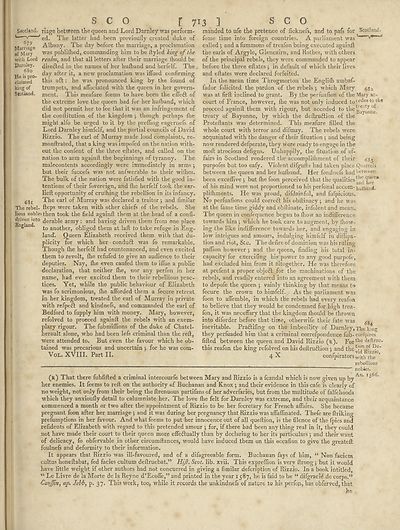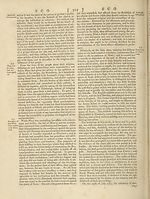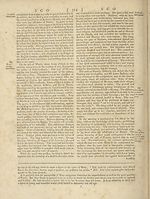Encyclopaedia Britannica, or, a Dictionary of arts, sciences, and miscellaneous literature : enlarged and improved. Illustrated with nearly six hundred engravings > Volume 18, RHI-SCR
(751) Page 713
Download files
Complete book:
Individual page:
Thumbnail gallery: Grid view | List view

SCO
r 713 3
SCO
680
He is pro¬
claimed
king of
S«otknd.
Scotland, nage between tbe queen and Lord Darnley was perform-
e{J# The latter had been previoufly created duke of
Marriage Albany. The day before the marriage, a proclamation
ef Mary was publilhed, commanding him to be ftyled king of the
with Lord realm, and that all letters after their marriage fhould be
Darnley. directed in the names of her hulband and herfelf. The
day after it, a new proclamation was iffued confirming
this aft : he was pronounced king by the found of
trumpets, and aflbciated with the queen in her govern¬
ment. This meafure feems to have been the efifeft of
the extreme love the queen had for her hulband, which
did not permit her to fee that it was an infringement of
the conltitution of the kingdom ; though perhaps ihe
might alfo be urged to it By the prefling eagernefs of
Lord Darnley himfelf, and the partial councils of David
Rizzio. The earl of Murray made loud complaints, re-
monftrated, that a king was impofed on the nation with¬
out the confent of the three eftates, and called on the
nation to arm againft the beginnings of tyranny. The
malecontents accordingly were immediately in arms •,
but their fuccefs was not anfwerable to their willies.
The bulk of the nation were fatisfied with the good in¬
tentions of their fovereign, and (he herfelf took the ear-
lieft opportunity of crufhing the rebellion in its infancy.
The earl of Murray was declared a traitor j and fimilar
The rebel- fteps were taken with other chiefs of the rebels. She
llous nobles then took the field againft them at the head of a confi-
En'land*10 ^era^e array • an<^ having driven them from one place
^ n ’ to another, obliged them at laft to take refuge in Eng¬
land. Queen Elizabeth received them with that du¬
plicity for which her conduct was fo remarkable.
Though Ihe herfelf had countenanced, and even excited
them to revolt, (he refufed to give an audience to their
deputies. Nay, ftie even caufed them to iflue a public
declaration, that neither fhe, nor any perfon in her
name, had ever excited them to their rebellious prac¬
tices. Yet, while the public behaviour of Elizabeth
was fo acrimonious, ftie afforded them a fecure retreat
in her kingdom, treated the earl of Murray in private
with refpeft and kindnefs, and commanded the earl of
Bedford to fupply him with money. Mary, however,
refolved to proceed againft the rebels with an exem¬
plary rigour. The fubmiffions of the duke of Chatel-
herault alone, who had been lefs criminal than the reft,
were attended to. But even the favour which he ob¬
tained was precarious and uncertain j for he was com-
Vol. XVIII. Part II.
6S1
manded to ufe the pretence of ficknefs, and to pafs for Scotland
fame time into foreign countries. A parliament was '—"■■'■v*—**'
called ; and a fummons of treafon being executed againft
the earls of Argyle, Glencairn, and Rothes, with others
of the principal rebels, they were commanded to appear
before the three eftates ; in default of which their lives
and eftates were declared forfeited.
In the mean time Throgmorton the Englifh ambaf-
fador folicited the pardon of the rebels 5 which Mary
was at firft inclined to grant. By the perfuafion of the Mary ac-
court of France, however, fhe was not only induced toce^es t0
proceed againft them with rigour, but acceded to the^^^
treaty of Bayonne, by which the deftruftion of the
Proteftants was determined. This meafure filled the
whole court with terror and difmay. The rebels were
acquainted with the danger of their fituation ; and being
now rendered defperate, they were ready to engage in the
moft atrocious defigns. Unhappily, the fituation of af¬
fairs in Scotland rendered the accomplilhment of their
purpofes but too eafy. Violent dilgufts had taken place Quarrels
between the queen and her hufband. Her fondnefs bad'oetweer
been exceflive $ but (he foon perceived that the qualities
of his mind were not proportioned to his perfonal accom- hulband.
plifhments. He was proud, difdainful, and fufpicibus.
No perfuafions could corredt his obftinacy ; and he was
at the fame time giddy and obftinate, infolent and mean.
The queen in confequence began to fhow an indifference
towards him *, which he took care to augment, by fhow-
ing the like indifference towards her, and engaging in
low intrigues and amours, indulging himfelf in diflipa-
tion and riot, &c. The defire of dominion was his ruling
paflion however ; and the queen, finding his total in¬
capacity for exercifing his power to any good purpofe,
had excluded him from it altogether. He was therefore
at prefent a proper objedt for the machinations of the
rebels, and readily entered into an agreement with them
to depofe the queen ; vainly thinking by that means to
fecure the crown to himfelf. As the parliament was
foon to affemble, in which the rebels had every reafon
to believe that they would be condemned for high trea¬
fon, it was neceffary that the kingdom fhould be thrown
into diforder before that time, othenvife their fate was
inevitable. Pradlifing on the imbecility of Damley,The king
they perfuaded him that a criminal correfpondence fub- confpires
lifted between the queen and David Rizzio (r). por the deftruc-
this reafon the king refolved on his deftrudtion j and the,tlon ot Da'
X
. . 'vid Kizzio,
confpiratorswith the
rebellious
' 1 nobles.
An. 1555.
(r) That there fubfifted a criminal intercourfe between Mary and Rizzio is a fcandal which is now given up by
her enemies. It feems to reft on the authority ef Buchanan and Knox ; and their evidence in this cafe is clearly of
no weight, not only from their being the ftrenuous partifans of her adverfaries, but from the multitude of falfehoods
which they anxioufly detail to calumniate her. The love (he felt for Darnley was extreme, and their acquaintance
commenced a month or two after the appointment of Rizzio to be her fecretary for French affairs. She became
pregnant foon after her marriage j and it was during her pregnancy that Rizzio was affaflinated. Thefe are ftriking
prefumptions in her favour. And what feems to put her innocence out of all queftion, is the filence of the fpies and
refidents of Elizabeth with regard to this pretended amour j for, if there had been any thing real in it, they could
not have made their court to their queen more effe&ually than By declaring to her its particulars; and their w^ant
of delicacy, fo obfervable in other circumftances, would have induced them on this occafion to give the greateft
foulnefs and deformity to their information.
It appears that Rizzio was ill-favoured, and of a difagreeable form. Buchanan fays of him, “ Non faciem
cultus honeftabat, fed facies cultum deftruebat.” Hift. Scot. lib. xvii. This expreflion is very ftrong; but it would
have little weight if other authors had not concurred in giving a fimilar defeription of Rizzio. In a book intitled,
“ Le Livre de la Morte de la Reyne d’Ecoffe,” and printed in the year 1587, he is faid to be “ difgracie de corps.”
Caifjin, ap. Jebb, p. 37. This work, too, while it records the unkindnefs of nature to his perfoji, has obferved, that
he
r 713 3
SCO
680
He is pro¬
claimed
king of
S«otknd.
Scotland, nage between tbe queen and Lord Darnley was perform-
e{J# The latter had been previoufly created duke of
Marriage Albany. The day before the marriage, a proclamation
ef Mary was publilhed, commanding him to be ftyled king of the
with Lord realm, and that all letters after their marriage fhould be
Darnley. directed in the names of her hulband and herfelf. The
day after it, a new proclamation was iffued confirming
this aft : he was pronounced king by the found of
trumpets, and aflbciated with the queen in her govern¬
ment. This meafure feems to have been the efifeft of
the extreme love the queen had for her hulband, which
did not permit her to fee that it was an infringement of
the conltitution of the kingdom ; though perhaps ihe
might alfo be urged to it By the prefling eagernefs of
Lord Darnley himfelf, and the partial councils of David
Rizzio. The earl of Murray made loud complaints, re-
monftrated, that a king was impofed on the nation with¬
out the confent of the three eftates, and called on the
nation to arm againft the beginnings of tyranny. The
malecontents accordingly were immediately in arms •,
but their fuccefs was not anfwerable to their willies.
The bulk of the nation were fatisfied with the good in¬
tentions of their fovereign, and (he herfelf took the ear-
lieft opportunity of crufhing the rebellion in its infancy.
The earl of Murray was declared a traitor j and fimilar
The rebel- fteps were taken with other chiefs of the rebels. She
llous nobles then took the field againft them at the head of a confi-
En'land*10 ^era^e array • an<^ having driven them from one place
^ n ’ to another, obliged them at laft to take refuge in Eng¬
land. Queen Elizabeth received them with that du¬
plicity for which her conduct was fo remarkable.
Though Ihe herfelf had countenanced, and even excited
them to revolt, (he refufed to give an audience to their
deputies. Nay, ftie even caufed them to iflue a public
declaration, that neither fhe, nor any perfon in her
name, had ever excited them to their rebellious prac¬
tices. Yet, while the public behaviour of Elizabeth
was fo acrimonious, ftie afforded them a fecure retreat
in her kingdom, treated the earl of Murray in private
with refpeft and kindnefs, and commanded the earl of
Bedford to fupply him with money. Mary, however,
refolved to proceed againft the rebels with an exem¬
plary rigour. The fubmiffions of the duke of Chatel-
herault alone, who had been lefs criminal than the reft,
were attended to. But even the favour which he ob¬
tained was precarious and uncertain j for he was com-
Vol. XVIII. Part II.
6S1
manded to ufe the pretence of ficknefs, and to pafs for Scotland
fame time into foreign countries. A parliament was '—"■■'■v*—**'
called ; and a fummons of treafon being executed againft
the earls of Argyle, Glencairn, and Rothes, with others
of the principal rebels, they were commanded to appear
before the three eftates ; in default of which their lives
and eftates were declared forfeited.
In the mean time Throgmorton the Englifh ambaf-
fador folicited the pardon of the rebels 5 which Mary
was at firft inclined to grant. By the perfuafion of the Mary ac-
court of France, however, fhe was not only induced toce^es t0
proceed againft them with rigour, but acceded to the^^^
treaty of Bayonne, by which the deftruftion of the
Proteftants was determined. This meafure filled the
whole court with terror and difmay. The rebels were
acquainted with the danger of their fituation ; and being
now rendered defperate, they were ready to engage in the
moft atrocious defigns. Unhappily, the fituation of af¬
fairs in Scotland rendered the accomplilhment of their
purpofes but too eafy. Violent dilgufts had taken place Quarrels
between the queen and her hufband. Her fondnefs bad'oetweer
been exceflive $ but (he foon perceived that the qualities
of his mind were not proportioned to his perfonal accom- hulband.
plifhments. He was proud, difdainful, and fufpicibus.
No perfuafions could corredt his obftinacy ; and he was
at the fame time giddy and obftinate, infolent and mean.
The queen in confequence began to fhow an indifference
towards him *, which he took care to augment, by fhow-
ing the like indifference towards her, and engaging in
low intrigues and amours, indulging himfelf in diflipa-
tion and riot, &c. The defire of dominion was his ruling
paflion however ; and the queen, finding his total in¬
capacity for exercifing his power to any good purpofe,
had excluded him from it altogether. He was therefore
at prefent a proper objedt for the machinations of the
rebels, and readily entered into an agreement with them
to depofe the queen ; vainly thinking by that means to
fecure the crown to himfelf. As the parliament was
foon to affemble, in which the rebels had every reafon
to believe that they would be condemned for high trea¬
fon, it was neceffary that the kingdom fhould be thrown
into diforder before that time, othenvife their fate was
inevitable. Pradlifing on the imbecility of Damley,The king
they perfuaded him that a criminal correfpondence fub- confpires
lifted between the queen and David Rizzio (r). por the deftruc-
this reafon the king refolved on his deftrudtion j and the,tlon ot Da'
X
. . 'vid Kizzio,
confpiratorswith the
rebellious
' 1 nobles.
An. 1555.
(r) That there fubfifted a criminal intercourfe between Mary and Rizzio is a fcandal which is now given up by
her enemies. It feems to reft on the authority ef Buchanan and Knox ; and their evidence in this cafe is clearly of
no weight, not only from their being the ftrenuous partifans of her adverfaries, but from the multitude of falfehoods
which they anxioufly detail to calumniate her. The love (he felt for Darnley was extreme, and their acquaintance
commenced a month or two after the appointment of Rizzio to be her fecretary for French affairs. She became
pregnant foon after her marriage j and it was during her pregnancy that Rizzio was affaflinated. Thefe are ftriking
prefumptions in her favour. And what feems to put her innocence out of all queftion, is the filence of the fpies and
refidents of Elizabeth with regard to this pretended amour j for, if there had been any thing real in it, they could
not have made their court to their queen more effe&ually than By declaring to her its particulars; and their w^ant
of delicacy, fo obfervable in other circumftances, would have induced them on this occafion to give the greateft
foulnefs and deformity to their information.
It appears that Rizzio was ill-favoured, and of a difagreeable form. Buchanan fays of him, “ Non faciem
cultus honeftabat, fed facies cultum deftruebat.” Hift. Scot. lib. xvii. This expreflion is very ftrong; but it would
have little weight if other authors had not concurred in giving a fimilar defeription of Rizzio. In a book intitled,
“ Le Livre de la Morte de la Reyne d’Ecoffe,” and printed in the year 1587, he is faid to be “ difgracie de corps.”
Caifjin, ap. Jebb, p. 37. This work, too, while it records the unkindnefs of nature to his perfoji, has obferved, that
he
Set display mode to:
![]() Universal Viewer |
Universal Viewer | ![]() Mirador |
Large image | Transcription
Mirador |
Large image | Transcription
Images and transcriptions on this page, including medium image downloads, may be used under the Creative Commons Attribution 4.0 International Licence unless otherwise stated. ![]()
| Permanent URL | https://digital.nls.uk/193028470 |
|---|
| Attribution and copyright: |
|
|---|
| Description | Ten editions of 'Encyclopaedia Britannica', issued from 1768-1903, in 231 volumes. Originally issued in 100 weekly parts (3 volumes) between 1768 and 1771 by publishers: Colin Macfarquhar and Andrew Bell (Edinburgh); editor: William Smellie: engraver: Andrew Bell. Expanded editions in the 19th century featured more volumes and contributions from leading experts in their fields. Managed and published in Edinburgh up to the 9th edition (25 volumes, from 1875-1889); the 10th edition (1902-1903) re-issued the 9th edition, with 11 supplementary volumes. |
|---|---|
| Additional NLS resources: |
|

